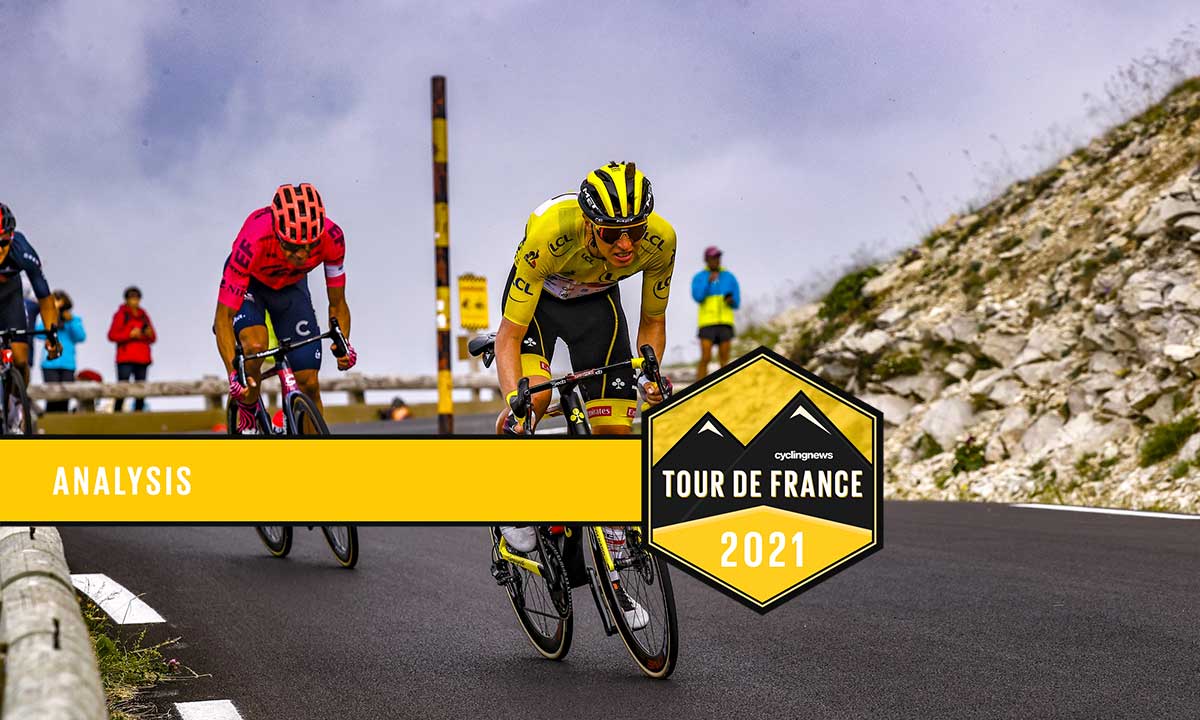GC analysis: Tadej Pogacar knocked off stride on Ventoux but still on track at Tour de France
Yellow jersey manages moment of crisis to extend overall lead

Mont Ventoux, as Ferdi Kubler was reputedly warned all those years ago, isn't a col like the others. Tadej Pogačar isn't a rider like the others either, but like so many Tour de France winners before him, he was unable to bend the Giant of Provence to his will when the race made its novel double ascent on Wednesday afternoon.
For the first time on this Tour, Pogačar betrayed the faintest sign of weakness after he had responded promptly – too promptly, as it turned out – to Jonas Vingegaard's crisp attack a little under 2km from the summit.
Given his body of work in the Alps last weekend, one might have expected Pogačar to respond with an acceleration of his own, but within 400 metres, he allowed a gap to open to Vingegaard's rear wheel. As he passed the lonesome observatory near the summit, Pogačar was 37 seconds down on the Dane.
Not for the first time in Tour history, the race's previous logic was distorted on the arid upper reaches of Mont Ventoux, but while the magic mountain's mystique remains intact, so too did Pogačar's composure. The Slovenian knew he couldn't match Vingegaard's pace, but he was aware, too, that allies of circumstance were close at hand. As he began the descent towards the finish in Malaucène, he slowed and waited to be joined by Rigoberto Urán (EF-Nippo) and Richard Carapaz (Ineos).
That trio combined as smoothly as the rapid drop allowed, and they caught Vingegaard within sight of the line. As if to excise any memory of his earlier vulnerability from his rivals' minds, Pogačar proceeded to outsprint them to fourth place on the stage.
With Ben O'Connor (AG2R-Citroën) losing almost four minutes, Pogačar's most difficult day ended with an even bigger buffer in the overall standings. He now has 5:18 in hand on the second-placed Uran, with Vingegaard a further 14 seconds back in third.
If Pogačar's raw strength in the Alps built that seemingly unassailable lead, then his coolness atop Mont Ventoux ensured that he maintained it. Just as golfers drive for show and putt for dough, a Tour victory isn't built on shock and awe alone. Managing the bad days is just as important.
The latest race content, interviews, features, reviews and expert buying guides, direct to your inbox!
"I can say definitely it was a good day," Pogačar said on Wednesday evening. "I didn't panic and that was a good thing. If I had panicked then maybe I would have cracked even worse. In the end, I didn't lose so much at the top and then in the downhill I could still push with the two other guys, so it was OK."
Pyrenees
Pogačar's enormous lead at the midpoint of the Tour facilitates his cause in more ways than one. As well as presenting him with a significant safety net in the event of a further jour sans, it has also meant that the men closest to him on general classification are already effectively racing against one another for second and third place.
Neither Urán nor Carapaz had any qualms about helping Pogačar close the gap on Vingegaard, for instance, which rather made up for the dearth of UAE Team Emirates riders in the yellow jersey group the second time up Mont Ventoux, where only Rafal Majka could offer some assistance.
The relative weakness of Pogačar's UAE Team Emirates squad – at least compared to the Ineos and Jumbo-Visma teams that dictated terms and conditions in previous editions – should be tested further in the Pyrenees, or perhaps even beforehand.
So too should Pogačar's apparent aversion to the heat. After dominating amid driving rain and cold in the Alps last weekend, the 22-year-old suggested that he had been helped by the conditions, pointing out that he had suffered in the warmer temperatures on the road to Le Creusot on stage 7. It was hardly coincidental that his brief travails atop the Ventoux came after a stage run off in typically Provencal warmth. The mercury is likely to remain high in the Pyrenees this weekend, even if Pogačar evinced few concerns on Wednesday evening.
"Stage 7 was super hot and super long. We were in the wind all day," Pogačar said. "Today was quite similar, with the wind and with the length. But I'm looking forward to the Pyrenees. I know the stages, they're super nice. Even if I have a bad day in the Pyrenees, I'm still looking forward it."
Even if Pogačar does endure further difficulties in the white heat of the Pyrenees, it is not immediately clear if anyone is poised to take advantage. Vingegaard, so impressive on Wednesday, is still a Tour debutant who arrived here with the rather different goal of riding on behalf of Primoz Roglič. "Pogačar is too far ahead," insisted directeur sportif Merijn Zeeman on Wednesday. Ineos looked to wind back the clock by setting the tempo all day, but at day's end, Carapaz was unable to accelerate when Michal Kwiatkowski swung off and road captain Luke Rowe failed to make it home inside the time limit.
Mont Ventoux knocked Pogačar off his stride on Wednesday afternoon, but it still seems unlikely that any rival can divert his Tour off track.

Barry Ryan was Head of Features at Cyclingnews. He has covered professional cycling since 2010, reporting from the Tour de France, Giro d’Italia and events from Argentina to Japan. His writing has appeared in The Independent, Procycling and Cycling Plus. He is the author of The Ascent: Sean Kelly, Stephen Roche and the Rise of Irish Cycling’s Golden Generation, published by Gill Books.